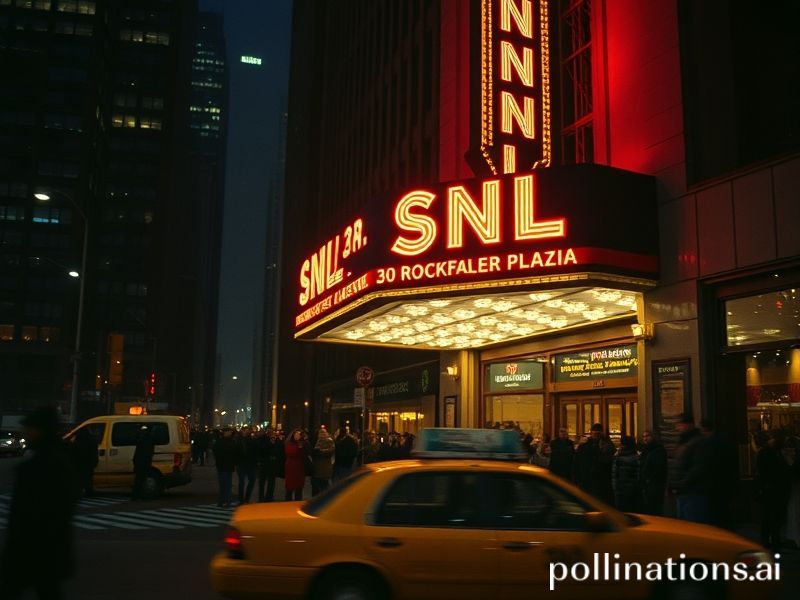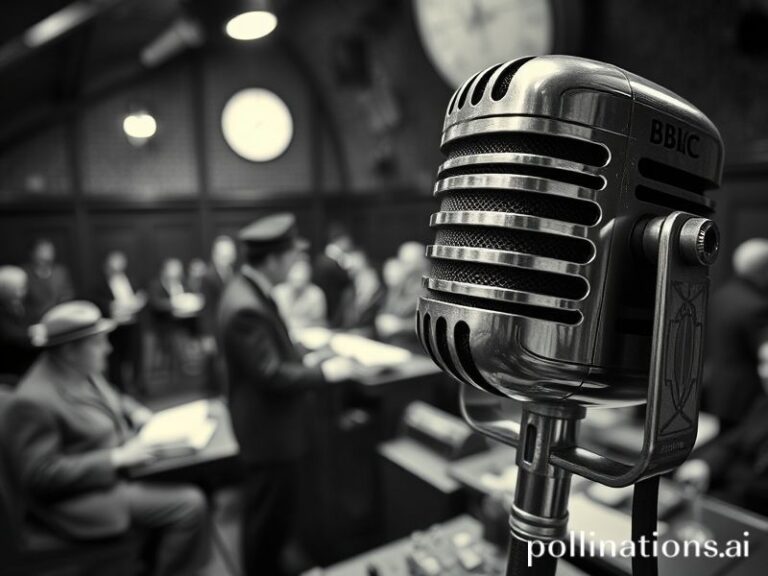Global Schadenfreude: How Saturday Night Live Became the World’s Weekly Therapy Session on American Chaos
For forty-nine seasons, Saturday Night Live—that rickety American sketch-comedy jalopy—has been careening down the global information superhighway with its tailpipe on fire, belching punchlines into the lungs of anyone with a Wi-Fi signal and a morbid curiosity about the United States. From Lagos to Ljubljana, insomniac teenagers and exhausted shift nurses have discovered that SNL is less a television show than a weekly weather report on the American id: partly cloudy with a 90 % chance of self-immolation.
It is tempting to dismiss the program as a provincial in-joke about Long Island accents and 1970s cast reunions. Yet the export statistics tell a darker, funnier story. Clips circulate on WeChat minutes after broadcast, subtitled by volunteers who have never set foot in New Jersey but can recite every Chris Christie fat joke like scripture. In Berlin techno clubs, DJs splice Kate McKinnon’s Rudy Giuliani into bass drops, the digital equivalent of sewing a whoopee cushion into the Bayeux Tapestry. Meanwhile, in Manila, call-center agents on their 3 a.m. break watch “Weekend Update” the way previous generations studied the BBC World Service—part distraction, part survival guide to the whims of the empire.
The show’s international footprint is, of course, a product of imperial leisure: America’s colossal media surplus, its habit of monetizing existential dread. But SNL also functions as a strange sort of soft-power confession booth. When the cold open features a sweating Alec Baldwin as Donald Trump, or James Austin Johnson’s uncanny Biden meanders through a sentence like a lost pensioner in a Home Depot, the rest of the world leans in not for the jokes but for the pathology report. It is the one moment when the hegemon admits, “Yes, we too realize this is insane,” which is oddly reassuring—like watching Caligula laugh at his own horse.
There are casualties in this cross-border laughter. Try translating a Pete Davidson joke about Staten Island into Hungarian; the cultural half-life is about four seconds before it decays into pure bafflement. Subtitle writers in Seoul must decide whether “Live from New York, it’s Saturday night!” is a battle cry or a cry for help, and whether either meaning matters once Kim Jong-un’s missile tests scroll across the lower third of the screen. The show’s satire assumes a shared civic religion—courts, ballots, late-night pizza—that simply doesn’t exist in places where “democracy” is spelled with scare quotes. The result is a kind of absurdist Esperanto: everyone recognizes the melody, nobody agrees on the key.
Still, the business model thrives on that very dissonance. YouTube views from outside the U.S. now constitute more than half of SNL’s digital audience, a statistic that keeps Lorne Michaels richer than several Balkan GDPs. International streaming rights are auctioned like indulgences: Tel Aviv gets the musical guest, Dubai gets the sketches minus alcohol references, Beijing gets a PowerPoint deck titled “Humor About Central Authority—Redacted.” Everyone receives a slightly different fun-house mirror in which to admire or recoil from the American reflection.
And so, each Saturday at 23:30 Eastern, a ritual plays out that is half pep rally, half autopsy. The planet tunes in not because the jokes are universally uproarious—some land like a drone strike of cringe—but because the spectacle offers a rare, live glimpse of a superpower publicly working through its latest nervous breakdown. We foreigners watch the way one watches a neighbor set his own lawn on fire: equal parts horror, pity, and gratitude that, for once, it isn’t our house.
When the credits roll and the band strikes up a funk riff that sounds suspiciously like the death rattle of Pax Americana, the feed cuts to local commercials: K-pop albums, Italian luxury cars, Qatari real estate. Somewhere in the algorithmic ether, a São Paulo teenager bookmarks the sketch about the Supreme Court, not because she understands habeas corpus, but because the robes look like Harry Potter and despair, like cholesterol, is a global value brand. In the end, Saturday Night Live is America’s longest-running horror-comedy: a weekly reminder that the world’s policeman also happens to be its clown, and the rest of us are stuck in the audience, popcorn in one hand, fire extinguisher in the other.







